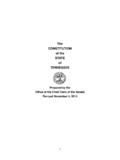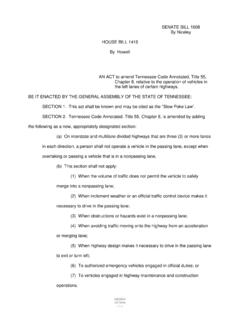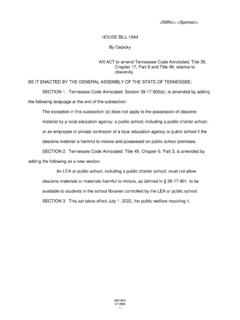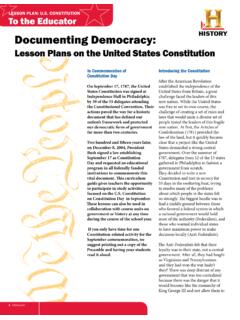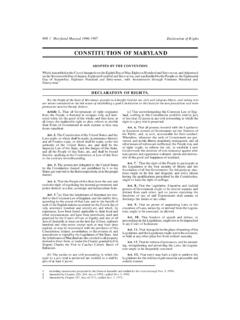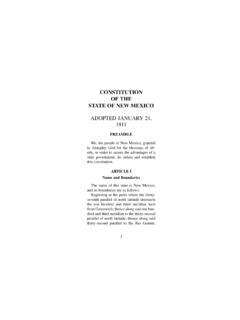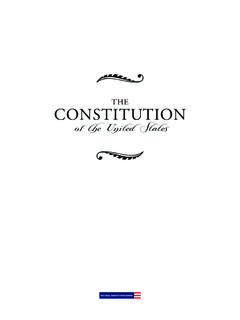Transcription of The CONSTITUTION of the STATE of TENNESSEE
1 The CONSTITUTION of the S TAT E of TENNESSEE Prepared by the Office of the Chief Clerk of the Senate Revised November 4, 2014 1 CONSTITUTION OF THE STATE OF TENNESSEE Preamble and Declaration of Rights Whereas, The people of the territory of the United States south of the river Ohio, having the right of admission into the general government as a member STATE thereof, consistent with the CONSTITUTION of the United States, and the act of cession of the STATE of North Carolina, recognizing the ordinance for the government of the territory of the United States north west of the Ohio River, by their delegates and representatives in convention assembled, did on the sixth day of February, in the year of our Lord one thousand seven hundred and ninety-six, ordain and establish a CONSTITUTION , or form of government, and mutually agreed with each other to form themselves into a free and independent STATE by the name of the STATE of TENNESSEE , and, Whereas, The General Assembly of the said STATE of TENNESSEE , (pursuant to the third section of the tenth article of the CONSTITUTION ,)
2 By an act passed on the Twenty-seventh day of November, in the year of our Lord one thousand eight hundred and thirty-three, entitled, "An Act" to provide for the calling of a convention, passed in obedience to the declared will of the voters of the STATE , as expressed at the general election of August, in the year of our Lord one thousand eight hundred and thirty-three, did authorize and provide for the election by the people of delegates and representatives, to meet at Nashville, in Davidson County, on the third Monday in May, in the year of our Lord one thousand eight hundred and thirty-four, for the purpose of revising and amending, or changing, the CONSTITUTION , and said convention did accordingly meet and form a CONSTITUTION which was submitted to the people, and was ratified by them, on the first Friday in March, in the year of our Lord one thousand eight hundred and thirty-five, and, Whereas, The General Assembly of said STATE of TENNESSEE , under and in virtue of the first section of the first article of the Declaration of Rights, contained in and forming a part of the existing CONSTITUTION of the STATE , by an act passed on the fifteenth day of November.
3 In the year of our Lord one thousand eight hundred and sixty-nine, did provide for the calling of a convention by the people of the STATE , to meet at Nashville, on the second Monday in January, in the year of our Lord one thousand eight hundred and seventy, and for the election of delegates for the purpose of amending or revising the present CONSTITUTION , or forming and making a new CONSTITUTION ; and, Whereas, The people of the STATE , in the mode provided by said Act, have called said convention, and elected delegates to represent them therein; now therefore, We, the delegates and representatives of the people of the STATE of TENNESSEE , duly elected, and in convention assembled, in pursuance of said act of Assembly have ordained and established the following CONSTITUTION and form of government for this STATE , which we recommend to the people of TENNESSEE for their ratification: That is to say ARTICLE I.
4 Declaration of Rights. Section 1. That all power is inherent in the people, and all free governments are founded on their authority, and instituted for their peace, safety, and happiness; for the advancement of those ends they have at all times, an unalienable and indefeasible right to alter, reform, or abolish the government in such manner as they may think proper. 2 Section 2. That government being instituted for the common benefit, the doctrine of nonresistance against arbitrary power and oppression is absurd, slavish, and destructive of the good and happiness of mankind. Section 3. That all men have a natural and indefeasible right to worship Almighty God according to the dictates of their own conscience; that no man can of right be compelled to attend, erect, or support any place of worship, or to maintain any minister against his consent; that no human authority can, in any case whatever, control or interfere with the rights of conscience; and that no preference shall ever be given, by law, to any religious establishment or mode of worship.
5 Section 4. That no political or religious test, other than an oath to support the CONSTITUTION of the United States and of this STATE , shall ever be required as a qualification to any office or public trust under this STATE . Section 5. The elections shall be free and equal, and the right of suffrage, as hereinafter declared, shall never be denied to any person entitled thereto, except upon a conviction by a jury of some infamous crime, previously ascertained and declared by law, and judgment thereon by court of competent jurisdiction. Section 6. That the right of trial by jury shall remain inviolate, and no religious or political test shall ever be required as a qualification for jurors.
6 Section 7. That the people shall be secure in their persons, houses, papers and possessions, from unreasonable searches and seizures; and that general warrants, whereby an officer may be commanded to search suspected places, without evidence of the fact committed, or to seize any person or persons not named, whose offences are not particularly described and supported by evidence, are dangerous to liberty and ought not be granted. Section 8. That no man shall be taken or imprisoned, or disseized of his freehold, liberties or privileges, or outlawed, or exiled, or in any manner destroyed or deprived of his life, liberty or property, but by the judgment of his peers, or the law of the land.
7 Section 9. That in all criminal prosecutions, the accused hath the right to be heard by himself and his counsel; to demand the nature and cause of the accusation against him, and to have a copy thereof, to meet the witnesses face to face, to have compulsory process for obtaining witnesses in his favor, and in prosecutions by indictment or presentment, a speedy public trial, by an impartial jury of the county in which the crime shall have been committed, and shall not be compelled to give evidence against himself. Section 10. That no person shall, for the same offence, be twice put in jeopardy of life or limb. Section 11. That laws made for the punishment of acts committed previous to the existence of such laws, and by them only declared criminal, are contrary to the principles of a free government; wherefore no ex post facto law shall be made.
8 Section 12. That no conviction shall work corruption of blood or forfeiture of estate. The estate of such persons as shall destroy their own lives shall descend or vest as in case of natural death. If any person be killed by casualty, there shall be no forfeiture in consequence thereof. Section 13. That no person arrested and confined in jail shall be treated with unnecessary rigor. 3 Section 14. That no person shall be put to answer any criminal charge but by presentment, indictment or impeachment. Section 15. That all prisoners shall be bailable by sufficient sureties, unless for capital offences, when the proof is evident, or the presumption great.
9 And the privilege of the writ of Habeas Corpus shall not be suspended, unless when in case of rebellion or invasion, the General Assembly shall declare the public safety requires it. Section 16. That excessive bail shall not be required, nor excessive fines imposed, nor cruel and unusual punishments inflicted. Section 17. That all courts shall be open; and every man, for an injury done him in his lands, goods, person or reputation, shall have remedy by due course of law, and right and justice administered without sale, denial, or delay. Suits may be brought against the STATE in such manner and in such courts as the Legislature may by law direct.
10 Section 18. The Legislature shall pass no law authorizing imprisonment for debt in civil cases. Section 19. That the printing press shall be free to every person to examine the proceedings of the Legislature; or of any branch or officer of the government, and no law shall ever be made to restrain the right thereof. The free communication of thoughts and opinions, is one of the invaluable rights of man and every citizen may freely speak, write, and print on any subject, being responsible for the abuse of that liberty. But in prosecutions for the publication of papers investigating the official conduct of officers, or men in public capacity, the truth thereof may be given in evidence; and in all indictments for libel, the jury shall have a right to determine the law and the facts, under the direction of the court, as in other criminal cases.
